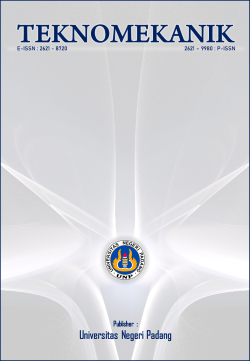Perceptions of strategies for revitalizing industrial work experience scheme toward vocational and business education graduates’ employability in public universities, Nigeria
DOI:
https://doi.org/10.24036/jptk.v6i4.34123Keywords:
Perceptions, Strategies, Public Universities, RevitalizingAbstract
This paper investigated educators and students’ of vocational and business education students’ perceptions of strategies for revitalizing industrial work experience scheme in public universities in Edo State. Four research questions and one hypothesis guided the study. The study utilized the descriptive survey. A sample of 66 vocational and business educators and 178 students making a total 242. The study used stratified random sampling technique. The instrument was a 4-point scale. It was rated Strongly Agree, Agree, Disagree and Strongly Disagree and assigned weights of 4, 3, 2 and 1 respectively. Two experts in Vocational Education validated the instrument. Reliability was done with test-retest method. 20 copies of the instrument were administered on 20 business education students who are in the population but not in the sample. The first and second administrations of the instrument were done in an interval of one week interval. Analyses of the data was done with PPMC (Pearson Product Moment Correlation) Coefficient and the reliability coefficient of the instrument yielded α = .78. Data for the study was analyzed with percentage, mean, standard deviation and t-test. Findings revealed that vocational educators and students agreed that all the institution based strategies such as train the institution based supervisors on the goals of ITF, identify placement opportunities for student’s attachment and plan practical contents and real life learning experience among others are necessary for effective revitalization of SIWES.
Downloads
References
Adeyewa, Z. D. (2015). Modernizing the Operations of the SIWES Programme: The Role of ITU and other Stakeholders. A Keynote Address delivered at the Maiden Edition of the Annual Lecture Series of the Industrial Training Unit, Federal University of Technology, Akure.
Agbonghale, G. O., & Iserameiya, F. E. (2017). Influence of Students’ Industrial Work Experience Scheme (SIWES) on students’ acquisition of entrepreneurial skills in Nigerian public universities in Edo State. World Journal of Research and Review (WJRR), 5(6), 31–35.
Akudolu, L. R. (2010). A Curriculum Framework for Entrepreneurship Education in Nigeria. UNIZIK Orient Journal of Education, 5(2), 104–111.
Alao, O. E., Osanyinro, J. B., & Alao, P. O. (2022). Achieving the effectiveness of the Students Industrial Work Experience Scheme for sustainability of the Nigerian economy. International Journal of Work-Integrated Learning, 23(3), 393–404.
Anyaeneh, V. K., & Ochuba, C. D. (2019). Influence of Students’ Industrial Work Experience Scheme (SIWES) in enhancing employable skills of business education students in federal tertiary institutions in Anambra State. Multidisciplinary Journal of Education, Research and Development, 3(1), 1–14.
Chidiebere, O.-N., Iloanya, K., & Udunze, U. (2014). Youth unemployment and entrepreneurship development: Challenges and prospects in Nigeria. Kuwait Chapter of the Arabian Journal of Business and Management Review, 4(4), 20.
Chinedu, S. (2022). Bodies involved in SIWES management & roles in Nigeria. Https://Siwesbeginner.Com/Siwes-Bodies/.
Chukwuma, E. M. (2015). Vocational and technical education: a solution to unemployment among graduates in Nigeria. Journal of Policy and Development Studies, 9(2), 91–94.
Ikechukwu, C. (2016). Recommended changes in students’ industrial work experience scheme (SIWES) geared towards decrease in unemployment rate of business education graduates in Nigeria. International Journal of Business and Management, 4(1), 49–68.
Jimoh, J. A., Maigida, J. A., & Adebayo, S. A. (2013). Strategies for improving school-industry relations for effective work preparation of automomobile technology students in the technical institutions in Lagos State. Review of Education Institute of Education Journal, 23(1), 137–155.
McQuaid, R. W., & Lindsay, C. (2005). The concept of employability. Urban Studies, 42(2), 197–219.
National Bureau of Statistics. (2020). Labor force statistics: Unemployment and underemployment report. Labor Force Statistics Unemployment and Underemployment Report, 1(December), 1–88.
Nwaozor, F. (2021). The Nigeria’s Students Industrial Work Experience Scheme (SIWES) And Challenges Thereof. https://www.tekedia.com/the-nigerias-students-industrial-work-experience-scheme-siwes-and-challenges-thereof/
Odu Obor, D., & Kayode, D. I. (2022). Highly Educated but Unemployable. In The Palgrave Handbook of Global Social Problems (pp. 1–21). Springer International Publishing. https://doi.org/10.1007/978-3-030-68127-2_162-1
Ojokuku, B. Y., Emeahara, E. N., Aboyade, M. A., & Chris-Israel, H. O. (2015). Influence of students’ industrial work experience scheme on professional development of library and information science students in South-West, Nigeria. Library Philosophy and Practice, 0_1.
Okechukwu, A., & Agwi, V. I. A. (2017). Strategies for enhancing technical students’ skills acquisition through Industrial Training Fund (ITF) in rivers state. Multidisciplinary Journal of Academic Excellence, 17(1), 1–14.
Omoniwa, O. B., & Adedapo, A. A. (2017). Assessing Nigerian graduate employability. Global Journal of Business Disciplines, 1(2).
Pantami, I. (2022). Nigerian graduates are lazy, unemployable.: Poeples Gazette. https://gazettengr.com/nigerian-graduates-are-lazy-unemployable-pantami/
Usman, A. S., & Tasmin, R. (2015). Entrepreneurial skills development strategies through the mandatory students’ industrial work experience scheme in Nigeria. Procedia-Social and Behavioral Sciences, 204, 254–258.





